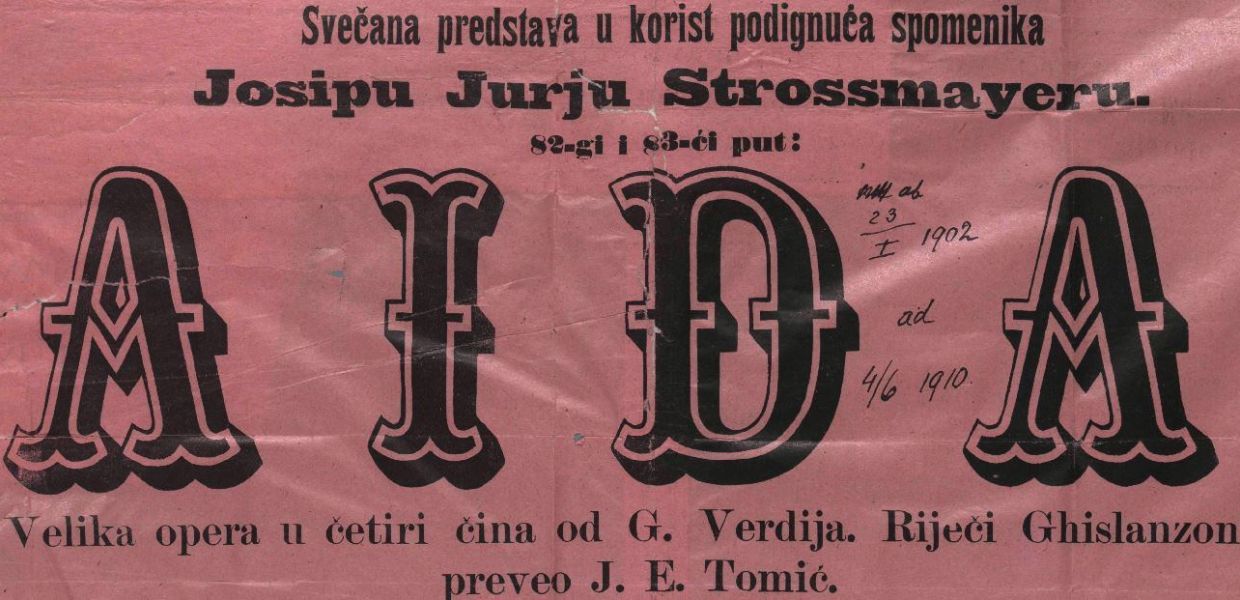The Playbills of the Croatian National Theatre in Zagreb

- Title:
- Playbill for the opera Aida by Giuseppe Verdi
- Date:
- 1908
- Institution:
- Croatian Academy Of Sciences And Arts
- Country:
- Croatia
- Copyright:
- Public Domain
The theatrical life of the Croatian capital Zagreb began in the 11th century and lasted, with interruptions, until its professionalization in the Croatian language, when the Leteće diletantsko pozorište (Flying dilettante theatre) from Novi Sad arrived to Zagreb and performed under the name of Domorodno teatralno društvo (Patriotic theatrical society) from 1840 to 1841. From 1844 to 1860, several theatre groups performed theatre productions in the Croatian language. Following the decline of German theatre active in Zagreb since 1780, the first and oldest Croatian national theatre – the Croatian National Theatre in Zagreb – was established in 1860.
Since the Department of Theatre Studies (today: the Division for the History of Croatian Theatre of the Institute for the History of Croatian Literature, Theatre and Music at the Croatian Academy of Sciences and Arts) was established in 1966, the archival records, playbills, and programmes of the Croatian National Theatre in Zagreb are kept at the Division. All playbills dating from 1870 until today have been organised according to theatre seasons, and most of them are collected in repertoire books (169 books in total).
Since some of the playbills from the period between 1840 and 1860 and from the first decade of the Croatian National Theatre in Zagreb are kept at the Zagreb City Museum, the Division for the History of Croatian Theatre has also included the playbills from this museum in the digitization project. Since the beginning of digitization in 2009, all playbills dating from the 5th of September 1840 to the 10th of January 1912 have been digitized – 8,503 playbills in total. The playbills are provided with metadata and deposited in the DIZBI collection. The digitization of the playbills continues, and further 500 playbills are being prepared for processing.
It is well known that contemporary theatre studies consider playbills primary theatrical sources, and that not many theatres have their entire collection of playbills preserved. Playbills are not only reminders of theatre productions and theatre artists, but also documents of considerable social, cultural, historical, and political value, since they reveal information on the production numbers, the theatrical genres, and the response of theatre audience, as well as the relationship of one national theatre culture towards other nations and cultures.
The DIZBI collection also includes four books of theatre repertoires – Repertoar hrvatskih kazališta, compatible with the digitized playbills:
- Hećimović, Branko, pr. i ur. (1990.), Repertoar hrvatskih kazališta 1840/1860/1980, knj. 1, Globus, JAZU, Zagreb.
- Hećimović, Branko, pr. i ur. (1990.), Repertoar hrvatskih kazališta 1840/1860/1980, knj. 2, Globus, JAZU, Zagreb.
- Hećimović, Branko, pr. i ur. (2002.), Repertoar hrvatskih kazališta, knj. 3, Hrvatska akademija znanosti i umjetnosti, AGM, Zagreb.
- Ljubić, Lucija; Petranović, Martina (2012.), Repertoar hrvatskih kazališta, knj. 5 – Deskriptivna obrada važnijih predstava na hrvatskom jeziku i izvedbi na stranim jezicima hrvatskih izvođača do 1840. godine, HAZU, AGM, Zagreb.
This collection of digitized playbills has been delivered by The Croatian Academy of Sciences and Arts (HAZU) to Europeana with over 7,300 playbills available for use under a Public Domain license.
Contact the institution at: [email protected]
